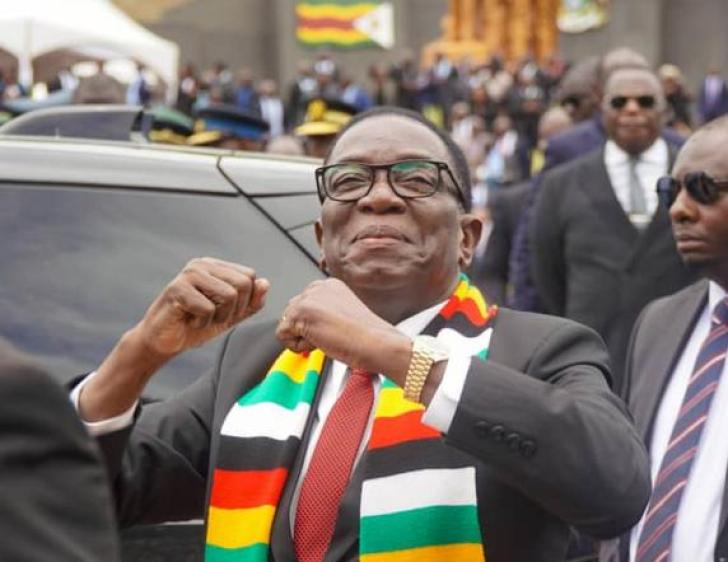News / National
Mnangagwa's Zanu-PF purges old guard
6 hrs ago | Views

ZANU-PF has announced a controversial directive to retire members of the "old guard" within the ruling party who are 65 years of age and above, effective April 1, 2025. The decision, which targets key office personnel rather than elected politicians, has sparked widespread surprise and anger among those affected, as well as raised fears among other senior party figures that they too could be next.
Sources within the party have confirmed that the retirement plan is a response to ongoing factionalism within ZANU-PF, with a particular focus on power struggles related to the controversial plot by President Emmerson Mnangagwa's loyalists to extend his presidency beyond 2028, until 2030. This agenda, known as the "2030 plan," has faced staunch resistance from both grassroots members and influential party organs, including war veterans.
Party insiders speculate that the old guard, who may have been sidelined by the 2030 agenda, are being sacrificed as part of the internal power battles. The retirement directive is seen by many as an attempt to purge senior members who could oppose the extension of Mnangagwa's rule.
ZANU-PF Director of Information, Farai Marapira, confirmed the developments when contacted for comment but declined to provide further details. "These are administrative issues that involve people personally, and we do not comment on our administrative processes which affect our employees on a personal level," Marapira stated.
The timing of the directive has raised eyebrows, especially following the establishment of a ZANU-PF Council of Elders in 2022. The council, composed of 10 members appointed at Mnangagwa's discretion, was intended to advise the president on important matters such as governance, foreign policy, and party affairs. The creation of the council was seen by many as a gesture to maintain party unity, but the retirement directive indicates growing divisions within the party.
The 2030 agenda, backed by Mnangagwa's supporters in regions such as the Midlands and Masvingo, has seen the emergence of prominent figures such as Ministers Owen Ncube (Midlands Provincial Affairs), Daniel Garwe (Local Government), and Tatenda Mavetera (ICT) as key advocates for the president's term extension. Despite this, Mnangagwa has distanced himself from the proposal, publicly stating that he intends to retire when his term ends in 2028.
The push for a presidential term extension has fueled intense factionalism within ZANU-PF, reminiscent of the political struggles leading up to the party's 2004 congress. At that time, a plot to elevate Mnangagwa to the vice presidency, and eventually the presidency, led to the downfall of numerous political figures. Mnangagwa, then the party's Secretary for Administration, survived the scandalous "Tsholotsho Declaration," which resulted in the ousting of several prominent ZANU-PF members.
Among the casualties of the 2004 plot were figures such as current Women's Affairs Minister Mabel Chinomona, exiled former Information Minister Jonathan Moyo, Energy Minister July Moyo, and former Speaker of Parliament Jacob Mudenda, among others.
With ZANU-PF now grappling with similar internal divisions, the retirement directive has deepened the sense of unease within the party, especially among those who fear they may be the next to be targeted in the ongoing factional power struggles. As the 2025 retirement deadline approaches, party members are anxiously watching how the political landscape will continue to evolve, with the 2030 agenda looming as a key point of contention.
Sources within the party have confirmed that the retirement plan is a response to ongoing factionalism within ZANU-PF, with a particular focus on power struggles related to the controversial plot by President Emmerson Mnangagwa's loyalists to extend his presidency beyond 2028, until 2030. This agenda, known as the "2030 plan," has faced staunch resistance from both grassroots members and influential party organs, including war veterans.
Party insiders speculate that the old guard, who may have been sidelined by the 2030 agenda, are being sacrificed as part of the internal power battles. The retirement directive is seen by many as an attempt to purge senior members who could oppose the extension of Mnangagwa's rule.
ZANU-PF Director of Information, Farai Marapira, confirmed the developments when contacted for comment but declined to provide further details. "These are administrative issues that involve people personally, and we do not comment on our administrative processes which affect our employees on a personal level," Marapira stated.
The 2030 agenda, backed by Mnangagwa's supporters in regions such as the Midlands and Masvingo, has seen the emergence of prominent figures such as Ministers Owen Ncube (Midlands Provincial Affairs), Daniel Garwe (Local Government), and Tatenda Mavetera (ICT) as key advocates for the president's term extension. Despite this, Mnangagwa has distanced himself from the proposal, publicly stating that he intends to retire when his term ends in 2028.
The push for a presidential term extension has fueled intense factionalism within ZANU-PF, reminiscent of the political struggles leading up to the party's 2004 congress. At that time, a plot to elevate Mnangagwa to the vice presidency, and eventually the presidency, led to the downfall of numerous political figures. Mnangagwa, then the party's Secretary for Administration, survived the scandalous "Tsholotsho Declaration," which resulted in the ousting of several prominent ZANU-PF members.
Among the casualties of the 2004 plot were figures such as current Women's Affairs Minister Mabel Chinomona, exiled former Information Minister Jonathan Moyo, Energy Minister July Moyo, and former Speaker of Parliament Jacob Mudenda, among others.
With ZANU-PF now grappling with similar internal divisions, the retirement directive has deepened the sense of unease within the party, especially among those who fear they may be the next to be targeted in the ongoing factional power struggles. As the 2025 retirement deadline approaches, party members are anxiously watching how the political landscape will continue to evolve, with the 2030 agenda looming as a key point of contention.
Source - the standard




































